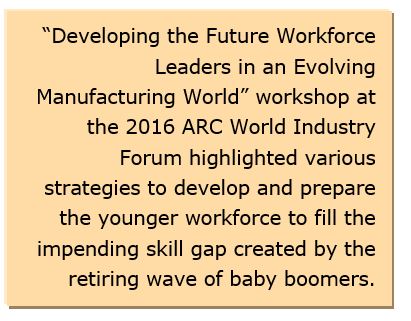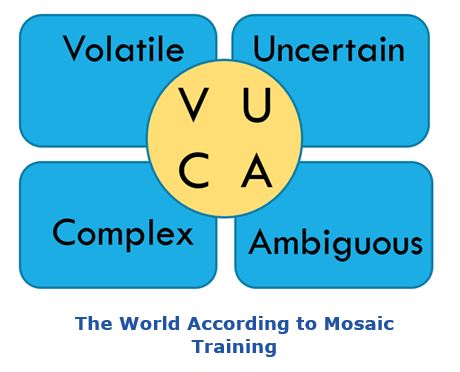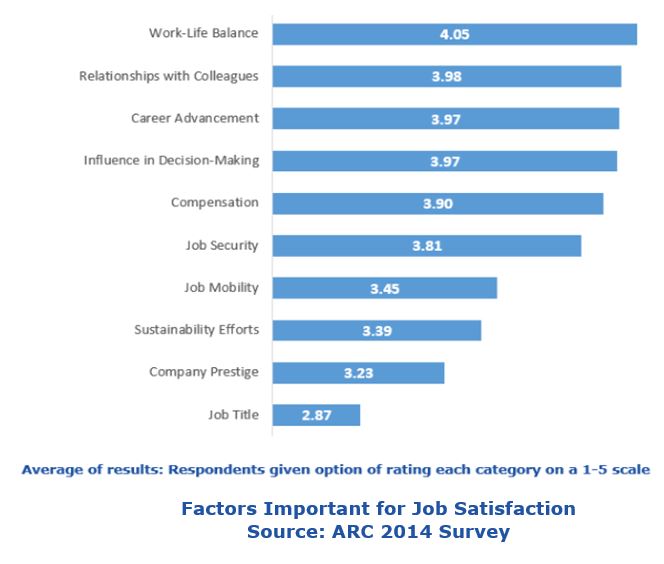

As Baby Boomers retire, the automation and manufacturing industries are losing critical experience. While technological innovations 
To address these issues, ARC once again hosted a dedicated workshop, “Developing the Future Workforce Leaders in an Evolving Manufacturing World.” It drew a good crowd and stimulated much lively discussion among workshop participants.
The session hosted three speakers: Sara Bernudez, Process Automation Engineer at Dow Chemical; Taylor Depew, Engineering Specialist at Owens Corning; and Michael Callanan Sr., CEO at Mosaic Learning. Following the presentations, Carrie Schaller, IT Director, Manufacturing Operations at Dow Chemical joined the presenters for a lively panel discussion. Then all workshop participants broke up into four groups for roundtable discussions on a variety of relevant topics ranging from knowledge transfer, mentorship programs, technology in the workplace, and attracting and retaining new employees to manufacturing and engineering.
Sara Bernudez and Taylor Depew, both recent graduates and new hires at their respective companies, shared their onboarding experiences. While the on-boarding process was different for both of them, both had participated in intern and co-op programs at their companies prior to full-time employment. Before joining Dow Chemical as full-time employee, Ms. Bernudez interned at the company twice. Mr. Depew also interned with three different departments (on four different occasions!) at Owens Corning as part of his co-op program. Both highlighted the importance of co-op and internship programs in preparing them for their careers at their companies.
Mr. Depew mentioned that his extensive co-op program provided him with valuable real-world work experience and prepared him to contribute immediately as a full-time employee. Ms. Bernudez’s experiences with Dow Chemical through internships helped her learn about the company, its culture, and all the growth opportunities the company could offer. These were some of the major factors contributing to her decision to work there. Notably, programs such as internships and co-op not only help the candidate learn about their prospective company, but also gives a chance for the hiring company to see if the candidate is a good fit.
Mosaic Learning, a training solutions company, leverages advanced technologies to develop engaging learning programs. The company’s COO, Michael Callanan, Sr., shared several workforce development strategies with the workshop participants. Mr. 
He further highlighted the importance of company culture. Many companies fail to recognize the critical role of culture to workforce development because its impact is difficult to measure. However, culture has significant impact on the company’s workforce development strategies and, in turn, on the company’s goals and ultimate profitability. A positive, reinforcing culture not only can help a company attract and retain top talent, but also promote the brand of the organization. Mr. Callahan also highlighted that there is not one “right” culture; every company can have its own definition of right culture, a culture that is well suited to deliver on the company's strategic objectives.
Audience members raised several great questions to the panel. One key question centered on the needs and expectations of “Millennial” workers in the manufacturing workplace. Discussions at the forum substantiate the findings of a 2014 ARC survey and point out that the Millennial generation is really not all that different than previous generations of workers. Just like workers of other generations, Millennials pay high importance to factors such as work-life balance, opportunities for career advancements, fair wages, etc.

Carrie Schaller of Dow Chemical further emphasized the importance of giving the younger workers opportunity to make their own decisions as well as listening to their ideas and opinions. Millennials want to know that their opinions matter. Therefore, it is important to show them that their ideas are heard and valued. Companies should establish a culture that allows for the consideration and encouragement of those ideas.
Soon to be a significant proportion of the workforce, the Millennial generation represents the future of manufacturing. With such a demographic shift on the horizon, industry must proactively develop strategies to attract, develop, and retain the younger generation of workers.
If employers want to retain younger workers, they should set honest expectations from the beginning. Employers should clearly explain what they could offer to the employee, especially in terms of work/life balance, opportunities relating to career advancement, company culture, etc. Potential employees should also share their expectations with their employers. Programs such as co-ops and internship can be of significant help to both parties in this regard. These short-term employment opportunities can help the potential new employee experience what the employer can offer, as well as help the employer to learn about potential employee’s capabilities and fit for the company.
Organizations need to carefully adopt leadership styles and company cultures that support the younger workforce. Although the impact of leadership and culture cannot be measured, these play a significant role in attracting and retaining young talent. Companies such as Google and Apple have been very successful at attracting and retaining highly talented individuals because of their culture, leadership style, and brand image.
Millennials are eager to take on responsibility and contribute to critical decisions. Employers should encourage younger workers to share ideas and help them build confidence by letting them have a say in crucial matters.
If you would like to buy this report or obtain information about how to become a client, please Contact Us
Keywords: Baby Boomers, Millennial Generation, Retirement, Training, Mentoring, Skill Gap, Retention, Workforce Development, Knowledge Transfer, Automation, Manufacturing, ARC Forum, ARC Advisory Group.

